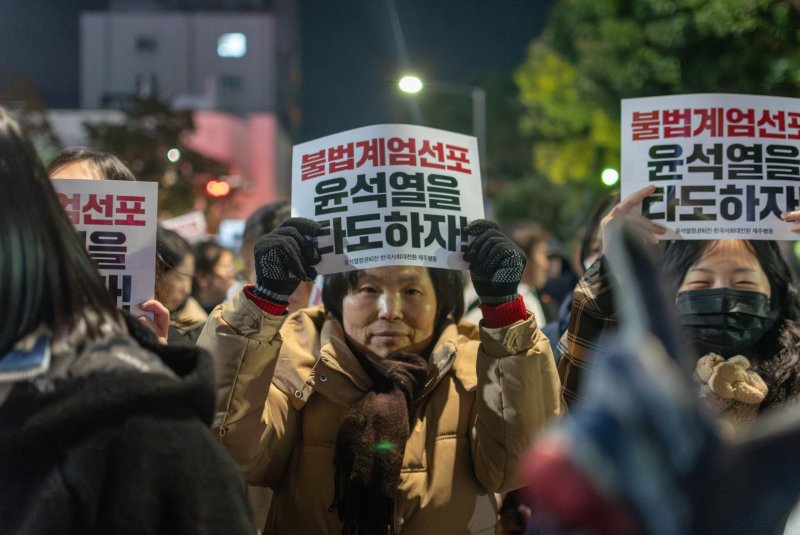1 of 6 | A woman holds up a sign during a demonstration calling for the resignation and arrest of South Korean President Yoon Suk-yeol on Friday night in Jeju City, Jeju Island, South Korea. Photo by Darryl Coote/UPI
JEJU ISLAND, South Korea, Dec. 6 (UPI) — Hundreds of South Koreans on the southern resort island of Jeju converged on City Hall on Friday night to demand that embattled South Korean President Yoon Suk-yeol resign and be arrested over his failed attempt earlier this week to institute martial law.
Organized by local unions and non-governmental organizers, the protest began at 7 p.m. local time with speeches, followed by a march of an estimated 1,000 people through Jeju’s downtown core, an area populated by restaurants and bars and a hot spot for university students.
The crowd waved flags, carried signs and chanted “Yoon Suk-yeol, step down. Arrest Yoon Suk-yeol.”
“Protests are happening everywhere, because he is not the president of Seoul, he’s the president of all Koreans,” Kim Jeong-hee, one of the protest organizers from a local union, told UPI.
Like many South Koreans, those who took to the streets Friday night on Jeju were enraged by their president’s late Tuesday declaration of martial law. Although it was rescinded by lawmakers after only a few hours, its declaration opened old wounds, unearthed buried trauma and ignited new fears.
The last time martial law was declared was in 1979, after the country’s decades-long dictator, President Park Chung-hee, was assassinated. That event led to the rise of another military dictatorship under President Chun Doo-hwan, which lasted until democracy finally came to the southern half of the peninsula in 1987.
However, the the first declaration of martial law in South Korea occurred in October 1948, just two months after the country’s founding, to suppress a rebellion in Suncheon and Yeosu ignited by soldiers who refused to be sent to Jeju to quell ongoing protests.
A month later, President Syngman Rhee again declared martial law, this time on Jeju. Under this order, and in the name of squelching a communist-led uprising, tens of thousands of islanders were slaughtered in what is now known as the Jeju Massacre, or the Jeju 4.3 Incident in Korean.
Kim Jung-hyun, 22, a Jeju native attending university in Seoul was among those marching in downtown Jeju Friday night. She told UPI that she was scared when she heard martial law had been declared.
“I couldn’t believe this was happening in the 21st century. I feel like I am in North Korea,” she said, adding that it is because of Jeju’s history that so many people were voicing their anger.
Yoon’s martial law declaration not only revived old fears on the island, but for some too young to remember the horrors of South Korea’s previous regimes, it posed a threat they were struggling to understand.
As the protest was ending, Byun Ji-yun, a 17-year-old Jeju high school student, came up to UPI and demanded to be heard.
She said she should be studying for her final exams next week, but she and her friends had to join the protest, for what was at stake was nothing less than their future.
“I’m learning about Korean history and I never thought that would happen again,” she said.
Byun said she was initially frightened after the declaration was made, but soon felt compelled to demonstrate against Yoon.
“It is my future,” she said. “I have to live in this country for maybe 60, maybe 70 years. This situation is about my future.”
The Democratic Party-led opposition has filed an impeachment vote against Yoon, which will be voted on Saturday evening.
Protest organizer Kim Jeong-hee stated that marches will continue nightly on Jeju until Yoon is impeached or resigns.
“Even if it doesn’t work tomorrow, we will keep going until the president resigns,” she said.
“Even though we are a small island, we are fighting to protect democracy.”
Jeju Island is home to fewer than 700,000 people. The demonstrations here since Yoon’s martial law are the largest the island has seen since Jeju residents came out on Dec. 3, 2016, in protest of then-President Park Geun-hye, who would be impeached on Dec. 9 of that year, according to local newspaper Jeju Sori.
